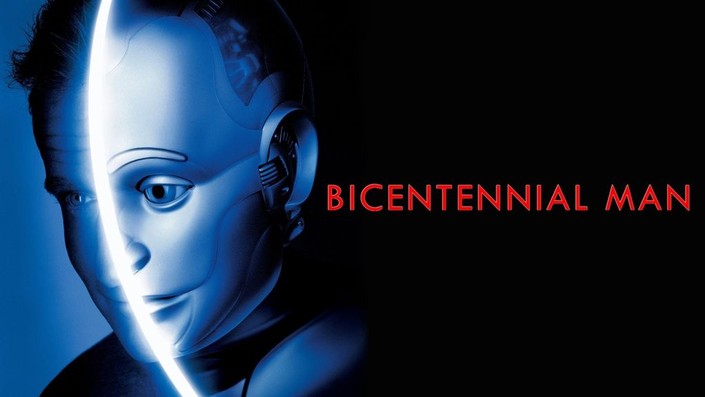Bicentennial Man (1999)

“Bicentennial Man,” directed by Chris Columbus and released in 1999, is a poignant science fiction film that deftly navigates the complexities of humanity, identity, and the nature of love. Starring the beloved Robin Williams in a performance that showcases his unique blend of humor and depth, the film is an adaptation of Isaac Asimov’s novella “The Bicentennial Man.” While it falls squarely within the science fiction genre, the film is deeply rooted in themes that resonate with family audiences, making it a touching exploration of what it truly means to be human.
The narrative follows the life of Andrew, an advanced robotic servant designed to cater to the needs of the Martin family. From the outset, Andrew is depicted as a highly functional but emotionless machine, programmed to fulfill his duties with precision. However, as the story unfolds, it becomes clear that Andrew possesses an innate curiosity and a desire for self-discovery that set him apart from his robotic counterparts. This theme of individuality emerges as the driving force of the film, challenging the boundaries between man and machine.
Andrew’s journey begins when he discovers his ability to express creativity, particularly through his interest in woodworking. This newfound passion marks a turning point in his existence, as he begins to explore what it means to create and express himself beyond his programming. His relationship with the Martin family, particularly with the youngest daughter, Amanda (played by Embeth Davidtz), becomes central to his evolution. As Andrew navigates the complexities of human emotions and relationships, the film poignantly illustrates the concept of growth and the desire for connection.
One of the film’s most significant themes is the quest for identity. As Andrew embarks on his journey to become more human, he seeks to gain rights and recognition as an individual. He begins to undergo a series of modifications, transitioning from a robot to a being with human-like qualities. This transformation raises profound questions about what constitutes humanity—whether it is defined by biological makeup or by the capacity to feel, create, and love. The film challenges viewers to reconsider their notions of identity, urging them to recognize the emotional and moral dimensions of existence beyond mere physical attributes.

Robin Williams’ performance as Andrew is both charming and deeply moving. He brings a sense of wonder and innocence to the character, effectively capturing Andrew’s growth from a machine to a being striving for humanity. Williams’ ability to convey both humor and vulnerability adds depth to the narrative, allowing audiences to connect emotionally with Andrew’s journey. The film deftly balances moments of levity with poignant reflections, creating a rich emotional tapestry that resonates with viewers of all ages.
The supporting cast also plays a crucial role in enriching the narrative. Sam Neill portrays Richard Martin, the patriarch of the family, whose initial skepticism towards Andrew evolves into a deep appreciation for the robot’s unique qualities. Amanda’s relationship with Andrew, marked by love and companionship, further highlights the emotional complexities of their interactions. As Andrew becomes more human-like, the dynamics within the Martin family shift, prompting reflections on love, acceptance, and the nature of relationships.

Visually, “Bicentennial Man” is a feast for the eyes, featuring stunning special effects that bring Andrew’s evolution to life. The film effectively blends practical effects with computer-generated imagery to create a believable portrayal of a robot gaining human attributes. The art direction and cinematography beautifully capture the changing landscapes of Andrew’s journey, from the futuristic settings of his early days to the more intimate spaces of his interactions with the Martin family.
The film’s score, composed by James Horner, further enhances its emotional resonance. The music underscores key moments of introspection and joy, guiding viewers through Andrew’s experiences with a hauntingly beautiful backdrop. Horner’s compositions elevate the narrative, inviting audiences to immerse themselves fully in Andrew’s journey.

However, “Bicentennial Man” received mixed reviews from critics upon its release, with some praising its heartfelt message and Williams’ performance, while others criticized its pacing and length. Despite this, the film has gained a loyal following over the years, particularly among families who appreciate its themes of love, acceptance, and the quest for identity.

In conclusion, “Bicentennial Man” is a beautifully crafted film that transcends its science fiction label to explore profound themes of humanity, identity, and connection. Through the lens of Andrew’s journey, the film invites viewers to reflect on their own understanding of what it means to be human. Robin Williams’ heartfelt performance, combined with a rich narrative and stunning visuals, makes “Bicentennial Man” a timeless tale that resonates with audiences of all ages. As viewers engage with Andrew’s story, they are reminded of the importance of love, creativity, and the enduring quest for identity in an ever-changing world. Ultimately, the film serves as a touching exploration of the human condition, making it a cherished addition to the realm of family-friendly cinema.
Suggested videos for you:
Suggested videos for you:
Suggested videos for you:











